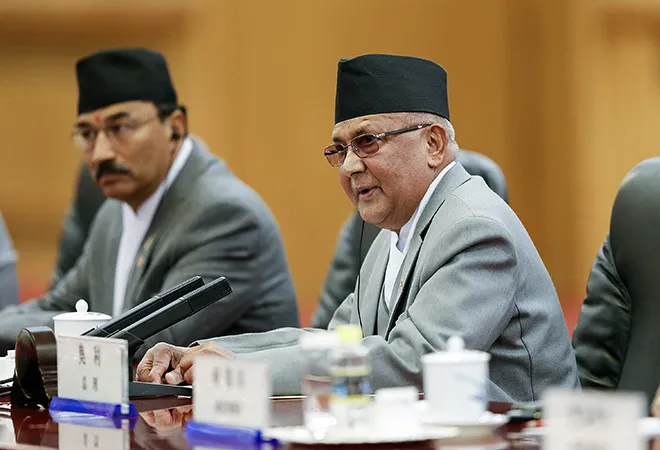
Nepal Communist Party (NCP) Chairman KP Sharma Oli-led government which was formed in February last year has been on roller-coaster for different reasons but it shrewdly managed in making adjustment with the ideological preoccupations and charting a course towards market capitalism. Nevertheless, in attracting the foreign investment to fulfill the internal aspirations of economic growth and prosperity, it couldn’t succeed the same way.
As it is in public reckoning, the internal resources are insufficient in Nepal and the country needs huge foreign investment to meet its domestic needs. Though instead exploring the dormant resources and channelising them for strengthening national economy, the governments have been making desperate attempts and without much care for fiscal management.
At all the major regional and international platforms, it has been a common feature to see prime minister, foreign minister, finance minister and other ministers urging to invest in Nepal. Not surprising, the economic diplomacy has been the center piece of its engagement with other countries.
Many multilateral cooperation platforms have eluded smaller nations, contradicting their own rationale for existence. Nepal is no exception to this phenomenon and has badly missed out on chances to carve out a position to deal with major bilateral issues in South Asia and beyond. The country’s long democratic transition has made its standing even more precarious.
Nepal...has badly missed out on chances to carve out a position to deal with major bilateral issues in South Asia and beyond. The country’s long democratic transition has made its standing even more precarious.
Living under an unjustified ‘big brother syndrome’ and making impractical moves for trilateral initiatives have broken down Nepal’s conventional edge vis-à-vis its relation with India. Nepal’s external policy should be directed by its own self-interest instead of excuses. The political establishment in Kathmandu should reckon that the diplomatic engagements of two almost equals—India and China—do not happen on a single front but on many counts.
In South Asia, Nepal is situated strategically to carry forward its independent stature. Despite the gloom and doom over the last two decades, Nepal is in general has endorsed democracy, political stability and a wave of economic reforms. This is a sort of accomplishment, as modern ideas and aspirations are routed through such welcome changes. If there is balance on the political home turf, it will be much easier for Nepal to claim its deserved position in the world.
In South Asia, Nepal is situated strategically to carry forward its independent stature. Despite the gloom and doom over the last two decades, Nepal in general has endorsed democracy, political stability and a wave of economic reforms.
There is no tailor-made solution for a firm footing in external matters except for being internally strong while chasing difficult targets externally. Relying less on theoretical paradigms and taking a more practical approach would make foreign policy maneuvering a more informed exercise. As a sovereign state, the boldness of Nepal’s action should display its sovereignty and priorities accordingly.
Coming in term with it and in a bid to draw the attention of international institutional investors, Government of Nepal had organised Nepal Investment Summit 2019 on March 29-30 in Kathmandu. This was a well thought out program planned and executed by Investment Board Nepal (IBN), the summit was attended by about 1400 participants including 700 foreign delegates from various companies. In two-day summit, there was highest participation from China which was followed by India, the two immediate neighbors.
The past trend, especially of last edition held in 2017 , had shown that commitment made by international investors was not translated into reality. This time around too, there was huge mismatch between in terms of projections made by PM Oli and actual materialisation. However, the Summit made a positive impact by creating an interface between the policymakers of Nepal with the international business players.
Government of Nepal had organised Nepal Investment Summit 2019 on March 29-30 in Kathmandu...the Summit made a positive impact by creating an interface between the policymakers of Nepal with the international business players.
During the Summit, some international investors had shown their initial interest in the projects. Of late, the Summit witnessed signing of 15 deals between Nepali (as JV Partner) and foreign companies. Similarly, out of 77 projects that government presented before international companies, there were only 17 applications for 10 projects.
Strikingly, Chaudhary Group, a homegrown conglomerate proved to be the most impactful deal-maker by making four joint-venture agreements in Solar Power, Logistics Park, and Mobile Network Service.
For the already existing Arun-III Hydropower Project, the Nepali and Indian financial institutions made the much needed commitments of Rs 78.59 billion. The 900 MW fledgling project would also receive additional financial commitments of Rs 65.60 billion from State Bank of India and Rs 8.12 billion and Rs 4.87 billion from Nepal’s Everest Bank and Nabil Bank respectively.
216 MW Upper Trishuli 1 hydroelectricity project had received the investment of $650 million. The policy decisions from Nepal Electricity Authority Board (NEAB) proved catalyst. The World Bank Group's International Finance Corporation (IFC) and Multilateral Investment Guarantee Agency (MIGA) will finance the project.
In another major energy deal, a Joint Development Agreement (JDA) was signed between China’s Yunnan Xinhua Water Conservancy and Hydropower Investment Co Ltd and Nepal’s Hydro Solution for the 164 MW Kali Gandaki Gorge Project.
The Special Economic Zone (SEZ) being a new idea for Nepal made news when a project was initiated in Bhairahawa, bordering India. It is yet not operationalised, the IBN, IFC and SEZ Authority had entered into institutional collaboration for developing SEZ in Simara through Public-Private Partnership (PPP).
Notwithstanding the euphoria, the official figure shows that after the formation of new government, Foreign Direct Investment (FDI) have gone down which has been a matter of worry for government. According to data provided by Department of Industry, Government of Nepal, FDI came down by 63 percent in the first eight months of fiscal 2018-19 compared to the same period last year.
According to a survey release by Nepal Rastra Bank (NRB), Nepal’s central bank, in June 2018, FDI inflows in Nepal was substantially low compared to neighboring countries. It shares only 0.01 percent of total FDI in the world while the South Asia received 3.1 percent of total FDI inflows in 2016.
As soon as Nepal tilted towards economic liberalisation in 1990, it was marred by long cycle of insurgency, political violence and instability. During the insurgency period, one of the stumbling blocks to foreign investment was strike and closure of factory by trade unions which were closed to political parties. With the inception of peace process in 2006 which officially ended violent insurgency of Maoist, the FDI gradually began to come in Nepal.
However, there were other factors too. For more than a decade, country faced a huge power outrage which is resolved now to a large extent. With the formation of new government, it seems that political environment has been created but other factors such as business licensing system, bureaucratic hassles, taxation system and proper legal framework call for positive interventions.
With the formation of new government, it seems that political environment has been created but other factors such as business licensing system, bureaucratic hassles, taxation system and proper legal framework call for positive interventions.
“Nepal needs to make paying taxes easier by simplifying the process of social security related payments. This is the reason that the recent labor act has made the process more cumbersome and contributed to pushing the country down five places to 110th in a global ranking for the ease of doing business”, said a World Bank report released in October 2018.
The multinational companies are facing difficulties to register their offices due to various reasons. Similarly, international investors are asking to make visa process hassle-free. After the complaints from international investors, government has formulated new laws along with amendment of laws which are already in place. On the eve of Summit, Parliament endorsed Foreign Investment and Technology Transfer Act, Public Private Partnership and Investment Act and Special Economic Zone Act (first amendment).
Those laws aim to ease the doing of business in Nepal clearing bureaucratic hurdles while establishing companies in Nepal: pre-establishment phase, operational phase and repatriation phase. In order to address the concerns of international investors, government has simplified the provisions on land acquisition, company registration, environmental assessment and infrastructure development.
In order to ease red tape in bureaucracy, government has pledged to provide all services from one place but it is not sure how it will be implemented. At the same time, there are criticisms that laws have been formulated in hurry without sufficient stakeholder consultations within the country. IBN presented 77 viable projects worth $31.93 billion (50 public and 27 private projects) during the Summit in key identified areas and could secure only a modest success: Energy, Tourism, Industry, Transport Infrastructure, Information and Communication Technology, and Agriculture for foreign investment.
In order to ease red tape in bureaucracy, government has pledged to provide all services from one place but it is not sure how it will be implemented.
Of late, Nepal’s Transport and Transit Treaty with China and the new electricity guideline issued by India that paves way for Nepal to trade electricity with third countries and construction of transmission line with India has generated hope among international investors. Courtesy IBN, the pre-feasibility study of these projects has been completed.
The experts in Kathmandu point out the need for continuous follow-ups after the Summit and creating an appropriate environment for the investment. Through rapid economic growth, Nepal aims to graduate from the status of Least Developing Country (LDC) to Middle Income Country (MIC) by 2030. For reaching there, the procedural reforms and macro-economic stability will be the major enablers.
The views expressed above belong to the author(s). ORF research and analyses now available on Telegram! Click here to access our curated content — blogs, longforms and interviews.




 PREV
PREV



